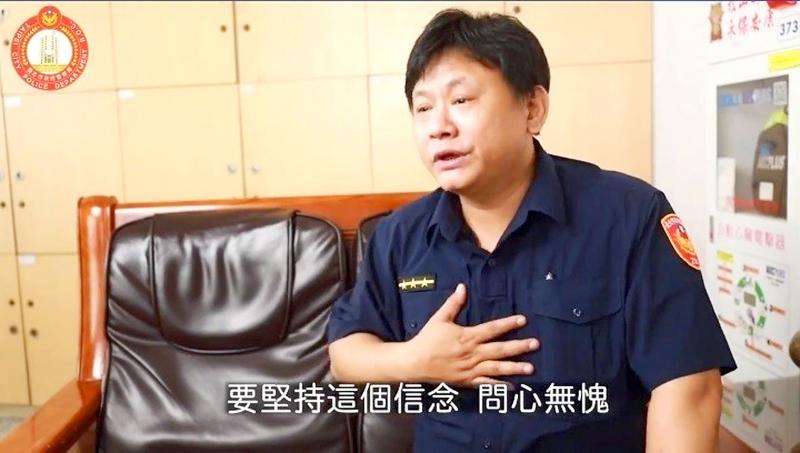Premier Su Tseng-chang (蘇貞昌) yesterday gave the green light to proposed amendments to the Act Governing the Use of Police Weapons (警械使用條例), which seek to broaden the definition of police weapons, as well as to form an investigative panel that would probe cases involving possible excessive use of force.
The act was last amended in 2002 and does not fully cover police use of weapons, some of which are outmoded and no longer fit the needs of officers discharging their duties, the Ministry of the Interior said.
In scenarios where officers are not carrying weapons or deem their weapons ineffective for dealing with a situation, they may employ other items, the proposal says.

Photo: screen grab from Facebook
The items, when being used, should be deemed police weapons, it says.
The ministry should set up an investigation panel comprising experts and academics to probe, of its own accord or at the behest of the judiciary, controversial incidents involving the use of police weapons that resulted in death or grievous bodily harm, to review the timing of the use of weapons and determine, if any, liability, it says.
The panel would provide police agencies with recommendations on police training on use of weapons and making ethical judgements, it says.
State compensation might be requested if the use of police weapons results in injuries or the loss of lives or assets, but a court might waive — in part or in full — the compensation if the party requesting compensation were legally liable, it says.
Asked if the draft amendments would be retroactively applied — for example, to officers who were tasked with evicting Sunflower movement protesters — if passed by the Legislative Yuan, Deputy Minister of the Interior Chen Tsung-yen (陳宗彥) said they would not.
However, a case can be opened to review past incidents involving possible excessive use of force if a judicial institute filed the request, he said.
Whether police use of force in the protest was proportionate has become an issue of heated debate, with many officers caught on film beating protesters with truncheons, and one slashing a protester’s legs with a shield after they had fallen to the ground.
A government agency might request compensation from a police officer if the officer “deliberately” caused people any of the aforementioned losses, it said.
Officer Chang Ching-yi (張景義) of Taipei’s Wanhua Precinct yesterday said he approved of the proposed amendments, but said that they should not be overly idealized.
To avoid drawing unfair conclusions on the use of police weapons, experts enlisted by the ministry should include police officers with hands-on experience who know that officers often have to make judgement calls on the spur of the moment, he said.
Chang in 2013 chased a man, surnamed Li (黎), who was accused of theft, to Taipei’s Ximending area (西門町) after Li evaded arrest and drove off in a vehicle. During the chase, Chang fired two rounds at the vehicle’s windshield to stop Li from driving onto a sidewalk, one of which penetrated Li’s abdomen, killing him.
After a six-year legal battle, the Supreme Court last year acquitted Chang.
Additional reporting by Wang Kuang-jen

Taiwanese can file complaints with the Tourism Administration to report travel agencies if their activities caused termination of a person’s citizenship, Mainland Affairs Council Minister Chiu Chui-cheng (邱垂正) said yesterday, after a podcaster highlighted a case in which a person’s citizenship was canceled for receiving a single-use Chinese passport to enter Russia. The council is aware of incidents in which people who signed up through Chinese travel agencies for tours of Russia were told they could obtain Russian visas and fast-track border clearance, Chiu told reporters on the sidelines of an event in Taipei. However, the travel agencies actually applied

Japanese footwear brand Onitsuka Tiger today issued a public apology and said it has suspended an employee amid allegations that the staff member discriminated against a Vietnamese customer at its Taipei 101 store. Posting on the social media platform Threads yesterday, a user said that an employee at the store said that “those shoes are very expensive” when her friend, who is a migrant worker from Vietnam, asked for assistance. The employee then ignored her until she asked again, to which she replied: "We don't have a size 37." The post had amassed nearly 26,000 likes and 916 comments as of this

New measures aimed at making Taiwan more attractive to foreign professionals came into effect this month, the National Development Council said yesterday. Among the changes, international students at Taiwanese universities would be able to work in Taiwan without a work permit in the two years after they graduate, explainer materials provided by the council said. In addition, foreign nationals who graduated from one of the world’s top 200 universities within the past five years can also apply for a two-year open work permit. Previously, those graduates would have needed to apply for a work permit using point-based criteria or have a Taiwanese company

The Shilin District Prosecutors’ Office yesterday indicted two Taiwanese and issued a wanted notice for Pete Liu (劉作虎), founder of Shenzhen-based smartphone manufacturer OnePlus Technology Co (萬普拉斯科技), for allegedly contravening the Act Governing Relations Between the People of the Taiwan Area and the Mainland Area (臺灣地區與大陸地區人民關係條例) by poaching 70 engineers in Taiwan. Liu allegedly traveled to Taiwan at the end of 2014 and met with a Taiwanese man surnamed Lin (林) to discuss establishing a mobile software research and development (R&D) team in Taiwan, prosecutors said. Without approval from the government, Lin, following Liu’s instructions, recruited more than 70 software